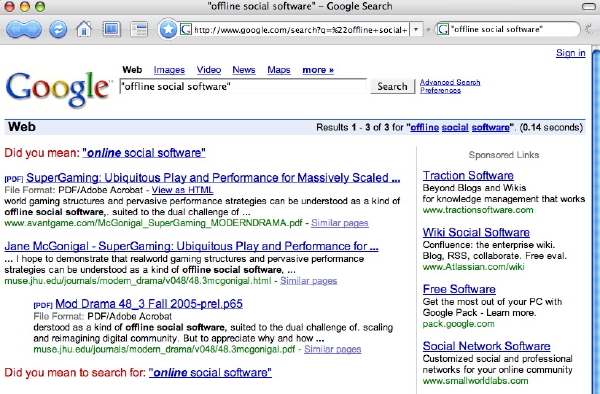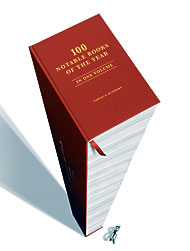Yet one more reason to check in to Alex Itin’s remarkable blog if you haven’t recently or ever. As you may have read here several weeks ago, alex started a group on Flickr, The Library Project, for people to post works that have been created by two or more artists, building serially on each other’s efforts. Last October Alex posted a beautiful video he made as an homage to the mystical Alpine light know as die alpen lumen. In a nod to the exquisite corpse form of The Library Project, a Japanese artist, Eat A Bug, posted a film he made in response. Serious kudos to alex and all his fellow artists who are demonstrating the power of collaboration and remix culture.
Monthly Archives: December 2006
no, dammit that’s not what i meant . . . .
I had a very interesting discussion in London the other day with Seb Mary, a brilliant young woman who is exploring ways of using the online world to encourage new forms of community in the offline world. Mary’s most exciting initiatives, which are quite relevant to our interests here at the institute, are still under wraps and i promised not to write about them yet, but she did mention having coined the phrase “offline social software.” Amazingly when i typed the phrase into Google i got back “Did you mean “online social software.” Is Google trying to tell us something? Is the very concept of an offline existence unthinkable in the Googlesphere?

networked books and more at forbes
Get yourselves on over to Forbes.com and check out this lovely set of essays that editors Michael Maiello and Michael Noer have collected on the future (and present) of the book, including a piece by yours truly on the networked book. Bob is also quoted at length in this piece on the need to rethink copyright.
From the editors’ intro:
Are books in danger?
The conventional wisdom would say yes. After all, more and more media–the Internet, cable television, satellite radio, videogames–compete for our time. And the Web in particular, with its emphasis on textual snippets, skimming and collaborative creation, seems ill-suited to nurture the sustained, authoritative transmission of complex ideas that has been the historical purview of the printed page.
But surprise–the conventional wisdom is wrong. Our special report on books and the future of publishing is brim-full of reasons to be optimistic. People are reading more, not less. The Internet is fueling literacy. Giving books away online increases off-line readership. New forms of expression–wikis, networked books–are blossoming in a digital hothouse.
People still burn books. But that only means that books are still dangerous enough to destroy. And if people want to destroy them, they are valuable enough that they will endure.
on today’s publications
 On November 27 the Pulitzer Prize Board announced that “newspapers may now submit a full array of online material-such as databases, interactive graphics, and streaming video-in nearly all of its journalism categories,” while the closest The New York Times’ 100 Notable Books of the Year came to documenting any changes in the publishing world is one graphic memoir (Fun Home by Alison Bechdel.)
On November 27 the Pulitzer Prize Board announced that “newspapers may now submit a full array of online material-such as databases, interactive graphics, and streaming video-in nearly all of its journalism categories,” while the closest The New York Times’ 100 Notable Books of the Year came to documenting any changes in the publishing world is one graphic memoir (Fun Home by Alison Bechdel.)
Only last year the Pulitzer Prize Board allowed for the first time some online content, but now, it will permit a broader, and much more current assortment of online elements, according to the different Pulitzer categories. The seemingly obvious restrictions are for photography, which permit still images only. They have decided to catch up with the times: “This board believes that its much fuller embrace of online journalism reflects the direction of newspapers in a rapidly changing media world,” said Sig Gissler, administrator of the Pulitzer Prizes. With its new rules for online submissions, the Pulitzer Board acknowledges that online elements such as a database, blog, interactive graphic, slide show, or video presentation count as items in the total number of elements, print or online, that can be considered worth a prize.
Even though the use of multimedia and computer technology has become ubiquitous not only in the media world but also in the performing arts, the book world seems absorbed in its own universe. The notion of “digital book” continues to mean digital copies of books and the consequent battle among those who want the lion’s share of the market (see “Yahoo Rebuffs Google on Digital Books”). And, when we talk about ebooks we mean devices for reading digital copies of books. Interestingly, most of the books published today are written, composed and set using electronic technology. So much of what we read online is full of distracting, sometimes quite interesting, advertising. On Black Friday, lots of people following the American tradition of shopping on that day did it online. It would seem that we are more than ready for real ebooks. I wonder how long it would take for one of them to hit the top lists of the year.
